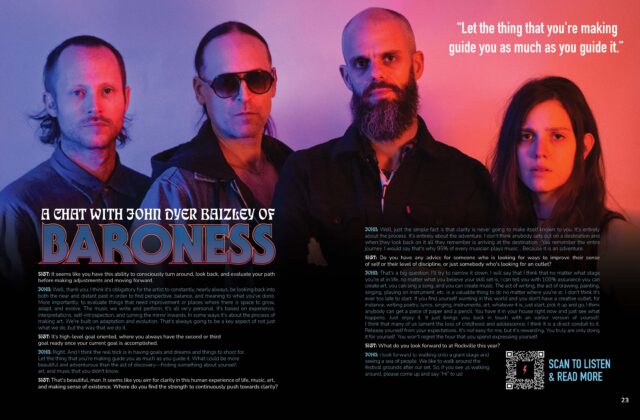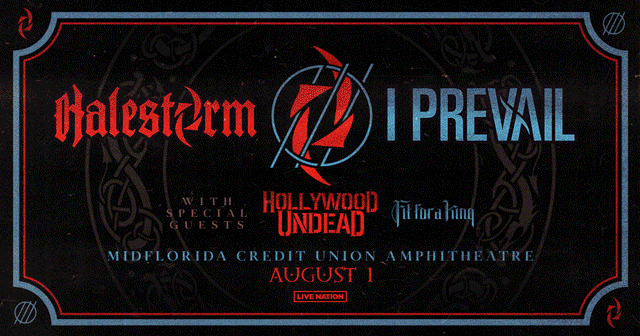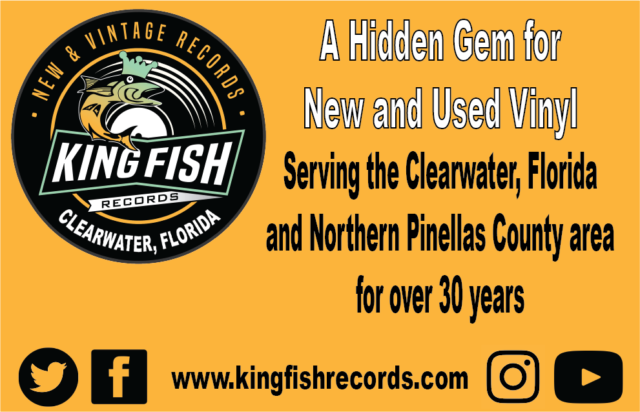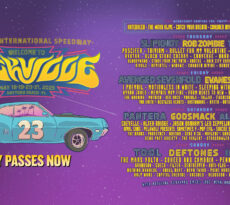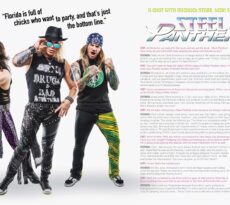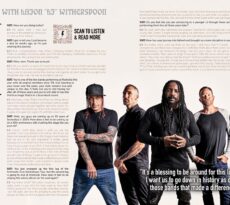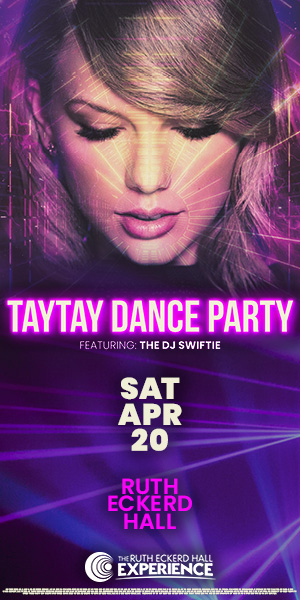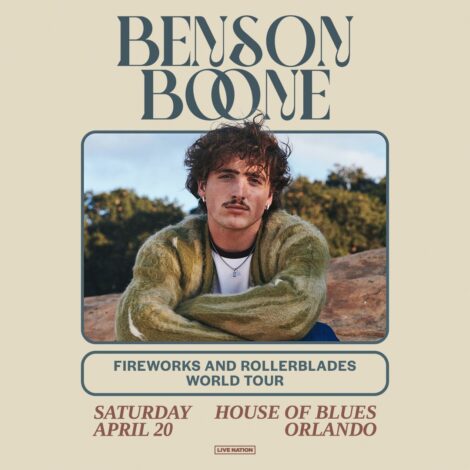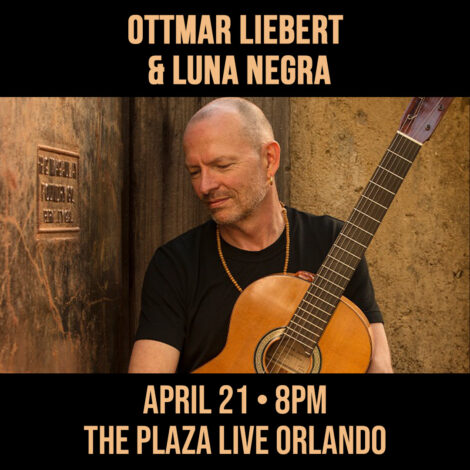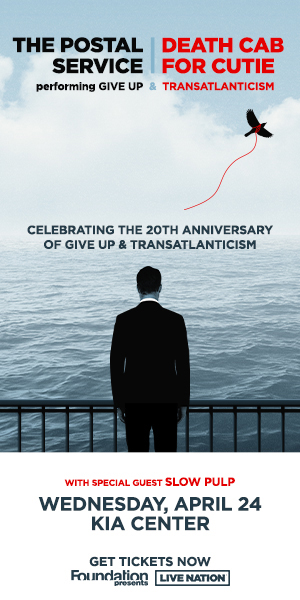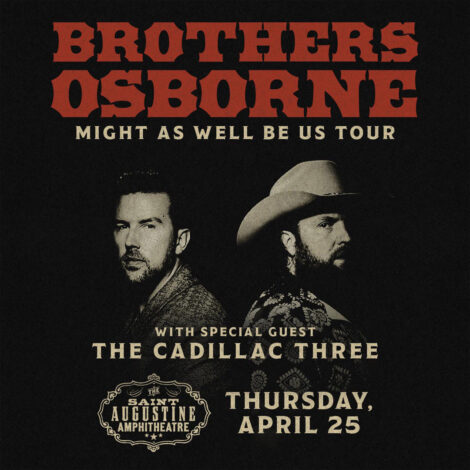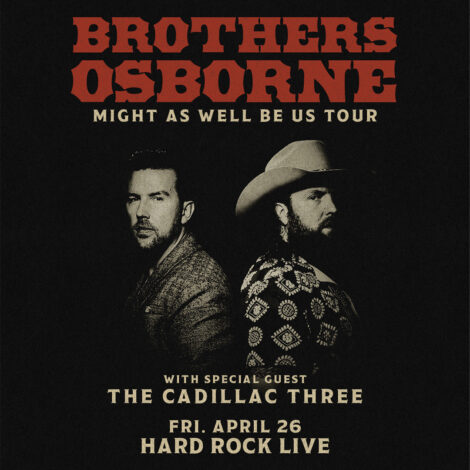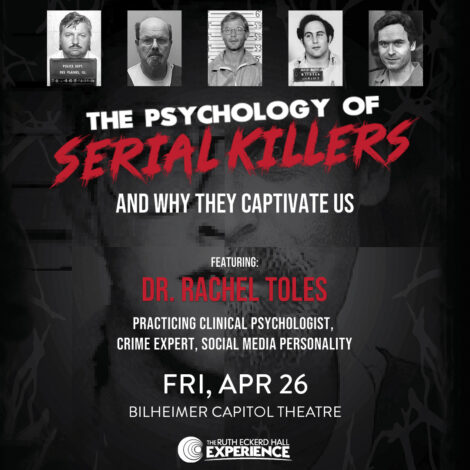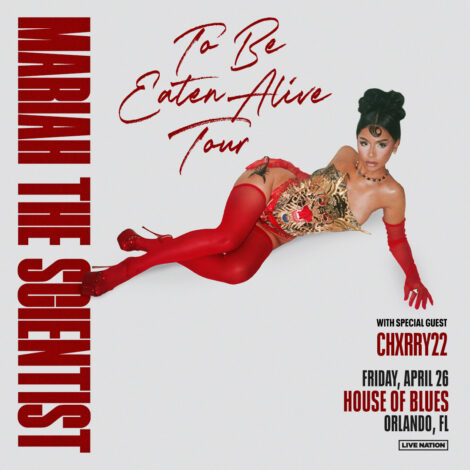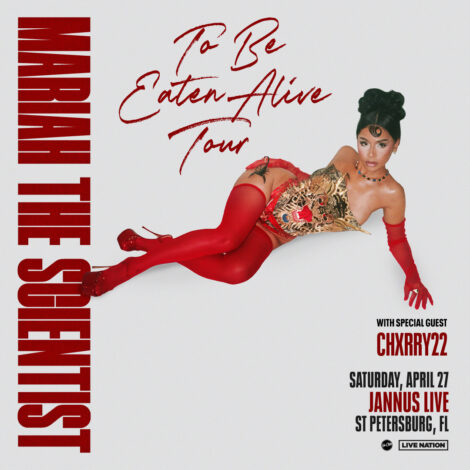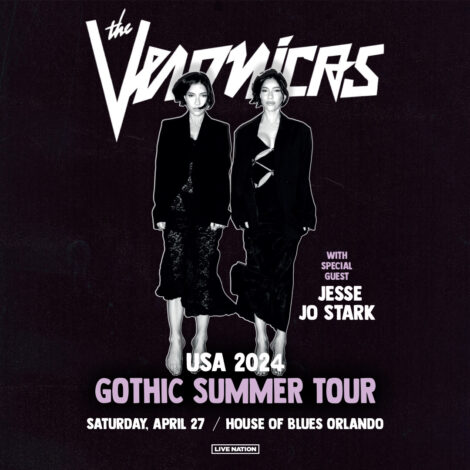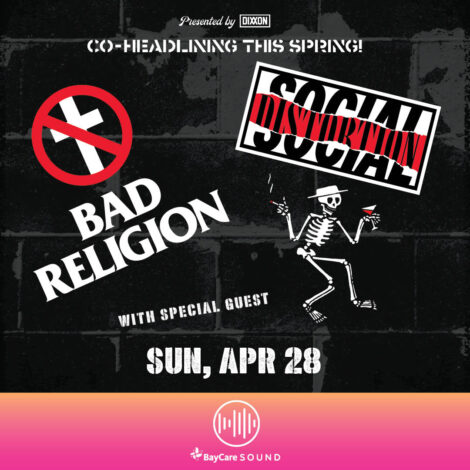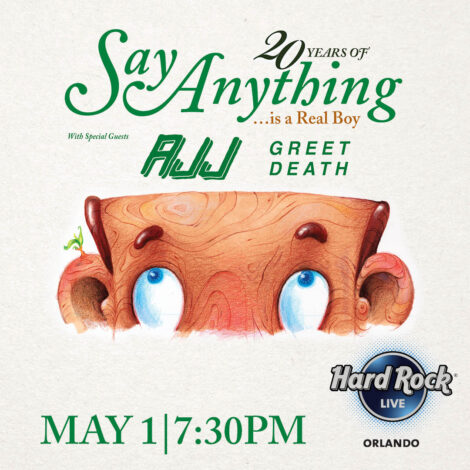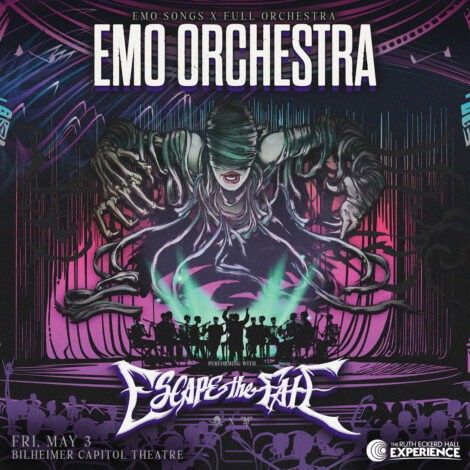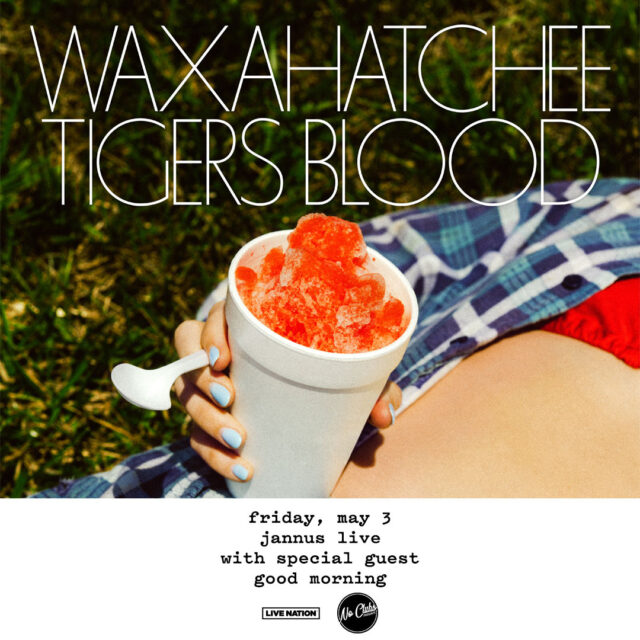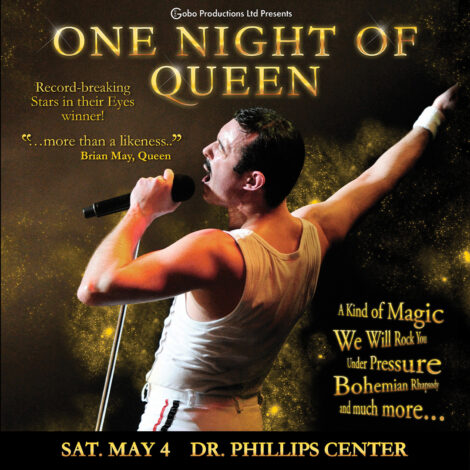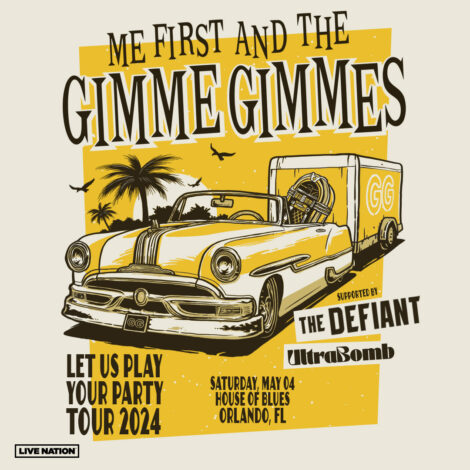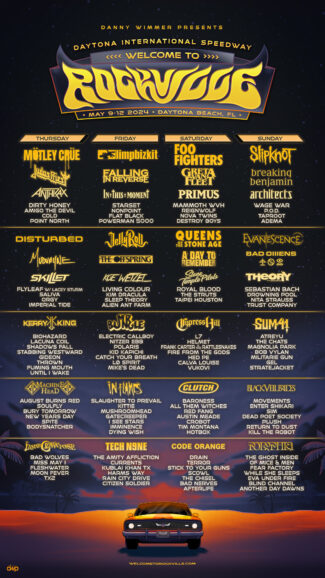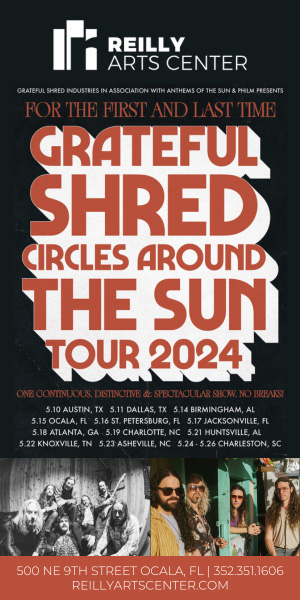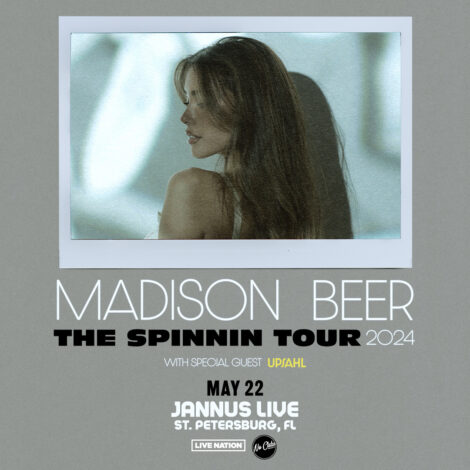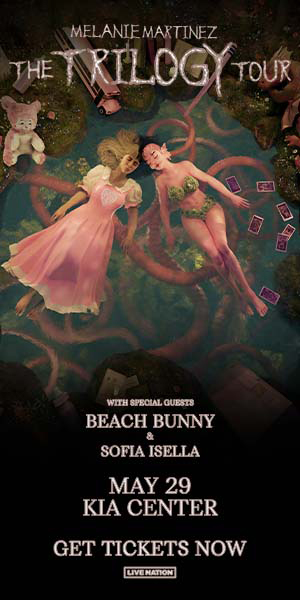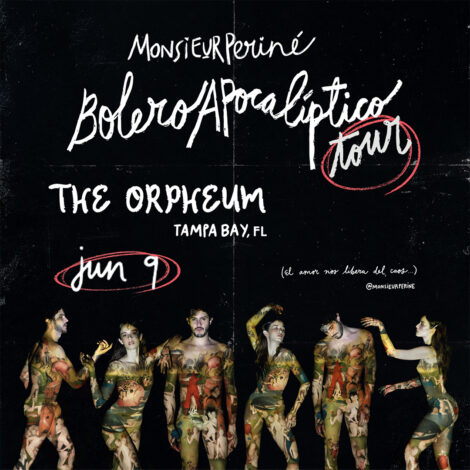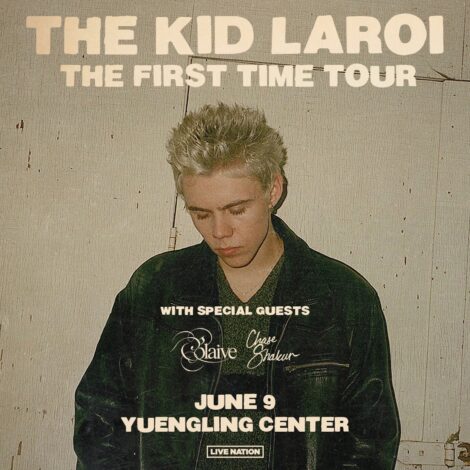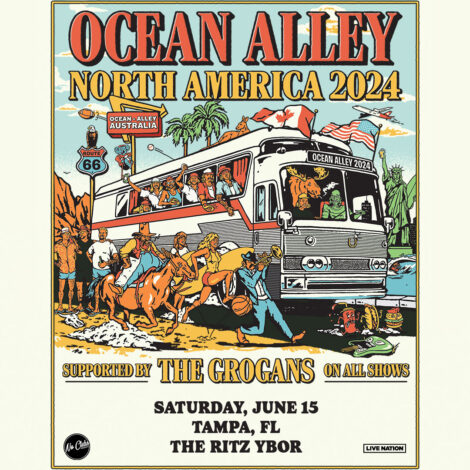A chat with John Dyer Baizley (founding member, lead vocals, guitar) of Baroness
Originally featured in the 2022 Welcome To Rockville Official Commemorative Guide.
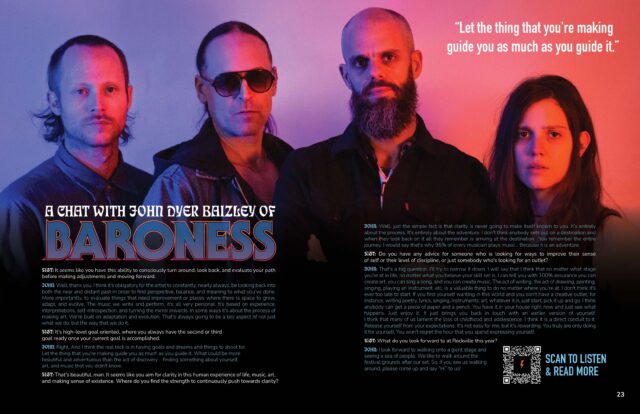
Baroness Interview – Rockville 2022
► L I S T E N H E R E ◄
SIGT: It seems like you have this ability to really consciously turn around, look back, and evaluate your path and make adjustments for moving forward.
John: Well, thank you. I think that it’s obligatory for the artist to constantly, nearly always be looking back into the near past and the distant past in order to find perspective, balance, and meaning to what you’ve done. More importantly, to evaluate things that need improvements or places where there is space to grow, adapt, and evolve. The music we write and perform, it’s all very personal. It’s based on experience, interpretations, self-introspection, and turning the mirror inwards. In some ways it’s about the process of making art. We’re built on adaptation and evolution. That’s always going to be a key aspect of not just what we do, but the way that we do it.
SIGT: It seems very goal-oriented, where you always have the second or third goal ready once your current goal is accomplished.
John: Right. And I think the real trick is in having goals and dreams and things to shoot for. The idea is you create that target in a broad sense and you define these concepts in very loose terms so that no matter what you do, you’re moving towards that type of goal. Then whenever there is a turn in the road, whenever we end up doing something that kind of veers off from what we initially thought we were doing, we tend to look at it and say, well, maybe this is a better thing. Let the thing that you’re making guide you as much as you guide it. What could be more beautiful and adventurous than the act of discovery—finding something about yourself, art, and music that you didn’t know. It’s just a matter of, metaphorically speaking, wading through the river and finding stones that are left to turn over and seeing what we can do in the context of a four piece rock band that we haven’t heard done before or that we wish somebody else was doing so we could listen to it. And I think that sort of internal driver is the best thing for us because we are always trying to impress one another, and when we’re all mutually impressed we know that we’re on to something.
SIGT: That’s beautiful, man. It seems like you aim for clarity in this human experience of life, music, art, and making sense of existence. Where do you find the strength to continuously push towards clarity?
John: Well, just the simple fact that clarity is never going to make itself known to you. I think like so many artists before us and so many artists that will come after us, it’s not about reaching or meeting your goals. It’s entirely about the process. It’s entirely about the adventure. I don’t think anybody sets out on a destination and when they look back on it all they remember is arriving at the destination. You remember the entire journey. I would say that’s why 95% of every musician plays music… Because it is an adventure. It’s an adventure in sound. It’s an adventure in composition. It’s an adventure in self-expression and communicating an idea to an audience. But there’s also a physical adventure. It also takes us around the world and exposes us to new people, new cultures, new modes of thinking, and all of those things rub off on you. As people, we’re built like sponges. When we travel and take our music elsewhere, we absorb as much as we put out there, and then that makes the act of coming home and writing something new and creating something a rewarding experience. The most exciting thing for me is that I always know there’s an open road ahead of us with many different potential directions, but I’m never sure which directions will head, and I don’t care. I truly think that the only way to create compelling, original, unique music is to just recognize when it’s happening and make sure that you catalog that. I think it’s important that we don’t lose that.
SIGT: I think we’re on the same page, for sure. And people make tons of money off commercial radio hits, et cetera, but that’s what they’re seeking. That’s what they want. That’s what they believe will fulfill them. And your sense of enlightenment takes you to a place where you were able to tap into something greater. In my opinion, that is just so much more pleasurable for the listener to experience.
Baroness: Unfortunately for us, we’ve never created an outright hit. There’s never been a commercial financial success that’s given us money enough to live a cushy lifestyle. We’ve never had a song or an album that’s so definitively the hit that we have to contend with following that off, or repeating. We aim to create albums that we think are beautiful, vast works of art, works of music where everything is as wild and wonderful and fantastic as it possibly can be and at the same time being grounded in reality. And then the audience gets to decide whether or not it’s good, whether or not we’ve done something. I’m a firm believer in the idea that if we’re internally creating that success before the record is even released, that the audience will find it. The audience that wants that music, the audience that needs that music will, in time, find it. It makes this band a more tricky sort of thing to be in, because it’s a whole lot more work and arguably a little bit less reward than in other musical ventures that I’m aware of. But I think that I can say that we stand by everything we’ve done, even the sort of failures that we’ve generated. At least we put ourselves into them. And two decades into this band with a line of changes from dramatic experiences. The ups and more often that not the downs of this life that I’ve lived.
SIGT: Man, there’s a book waiting to happen.
John: Yeah. But I feel that far more often than not we’re doing the right thing. I still approach each night on stage and each record and each song we write with the same amount of enthusiasm. I think that for me, in my mind, the goal in terms of creating, is to have that same kind of spark and fire that you do when you’re young— before your innocence dies, and before adolescence and puberty totally ruin your innocence—it’s pure creativity. I think the idea is to recognize in your adult life or your creative professional life how to tap into that earlier creative mechanism that we’re all born with and that we all have in some capacity but so many of us get snuffed out by reality.
SIGT: I’ve been thinking about that a lot lately.
John: I try to say the tougher something is on me the more difficult, more painstaking, more brutal, extreme, painful, backbreaking, bone-breaking thing that happens to me, the more I take that as a challenge to make something beautiful and honest.
SIGT: That’s your core inspiration, and that is true beauty.
John: It feels good to me. I know that when we’re on the tour, I have two or 3 hours a night where all that weight and all that pain is just gone. It’s gone when we perform. It’s gone when we’re in create mode. I think that is a good sign. I think that is anecdotal evidence to me that playing music and creating things is a net positive, is a constructive force, and a positive force in my life. So selfishly, I’m just trying to keep myself together with the art and music that I make, and I hope that it brings some of the peace which it brings me to our audience as well.
SIGT: The reason why it does, I believe, is because you feel so positively about it when you’re on stage, and it is such a net positive that it communicates it directly to the audience through actions. I mean, your words are incredible as well, but the way that your energy is feeding the audience, we just feed it right back to you. The only thing I can compare it to is how we run a blog as well, and we have a bunch of review writers, et cetera. When I’m giving them advice as to how to write, I always tell them to write in a good mood, right in a place where they’re back in that moment where they’re experiencing it, because that will translate directly to the words and to the reader and in your case, the listener.
John: I think that’s totally it. The mood that you’re in when you set out to do something really dictates the final product. I think the coolest things that we do, the stuff that I’m the most proud of happens when I feel it. You know, the blood pressure goes up and the energy… I can tell when it feels like all my atoms are just like in a rubber room bouncing off one another just trying to get out. I know that means I’m in a creative place and that I need to express something. However it goes. I think, honestly, the single most difficult experience through the pandemic was trying to create music. That feeling was kind of gone because I wasn’t out there soaking in new experiences. So I had nothing to just set that spark a light. Now to be back on tour and to be looking forward to the shows that we’ve got coming up later this year. It’s really inspiring. And it’s nice that there can be kind of a self-generating engine where we just get excited to play. So we play better. And that turns us into a better band. Maybe more people pay attention because we’re getting better. It’s the non-vicious cycle.
SIGT: When I see Baroness is from Savannah I immediately think SCAD but you actually went to design school in Rhode Island. Your attention to detail really bleeds into everything that you design. And you’ve made over 30 album covers for artists around the world. I know you’ve shared a lot of watercolor paintings, some Micron pen, even some colored pencil. What mediums of painting and drawing do you enjoy the most? And is there a favorite?
John: At this point I really enjoy working in watercolor. It’s just been the easiest media to work in with the style that I choose to use when I’m making the album covers. Initially, I really enjoyed doing black and white ink drawings, and watercolor was just the cleverest solution to adding color to these drawings without screwing things up. I probably spent the better part of the past 20 years painting. During the days of the Pandemic, I really studied pigments and the qualities of different pigments, and the different expressive qualities of the different papers, brushes, and things like that. I gave myself a project where I would do a painting a day, I would spend no longer than a day on it. And up until recently, it’d been really difficult for me letting go of art work, like selling it or giving it away. So I decided to start selling paintings. I just thought they were nice expressions and nice experiments in color, texture, and expression. I think I learned a lot in the past couple of years. It has slowly become a medium which I’ve come to love. I’m excited about some projects that I’m working on now.
SIGT: How would you say you’ve found self-improvement through your discipline of art?
John: I think my discipline of art is my self-improvement. I don’t have an easy time addressing my issues and my confusions. So everything that I have ever needed in order to understand myself and understand the world around me, I have found within the confines of the music, the art, the lyrics, and the artistic programs that I engage in. And I think the work at this stage in my life is trying to take those abstractions and those abstract lessons and to continually bring them into the concrete world, to understand how I can use my own creative process in ever more increasingly therapeutic ways.
SIGT: Do you have any advice for someone who is looking for ways to improve their sense of self or their level of discipline, or just somebody who’s looking for that outlet?
John: That’s a big question. I’ll try to narrow it down. I will say that I think that no matter what stage you’re at in life, no matter what you believe your skill set is, I can tell you with 100% assurance you can create art, you can sing a song, and you can create music. I’m not saying how good the quality is going to be. I’m going to say that the act of writing, the act of drawing, painting, singing, playing an instrument is a valuable thing to do no matter where you’re at, no matter whether or not you’ve ever spent any time with it in the past. There is a reason that many people, as they get into the later stages of life, pick up a paintbrush and start painting. I don’t think it’s ever too late to start. I think that if you find yourself wanting in this world and you don’t have a creative outlet, for instance, writing poetry, lyrics, singing, instruments, art, whatever it is just start, pick it up and go. You don’t have to do it with an audience. I think anybody can get a piece of paper and a pencil. You have it in your house right now and just see what happens. Just enjoy it.
SIGT: Well, you did a brilliant job summarizing my massive question. Let’s say that I also picked up a pencil over the pandemic and I started doing art as well. And it’s something I hadn’t done in fucking like 15 years. So I can’t say enough that I agree with what you’re saying.
John: Yes, it’s an amazing outlet and it just brings you back in touch with an earlier version of yourself. I think that many of us lament the loss of childhood and adolescence. I think it is a direct conduit to it. If you are able to release yourself from your expectations, that’s the biggest thing that I think prevents people from doing things like that once they’re older, and “Oh, I don’t draw” “I’m not artistic” “I’m not musical”. It’s not easy for me, but it’s rewarding. You just have to be comfortable enough with yourself to do something. It’s not going to come out sounding like Led Zeppelin or looking anything like Rembrandt. It’s going to come out looking and sounding like you. And that’s something you can constantly be improving on. You truly are only doing it for yourself. You won’t regret the hour that you spend expressing yourself.
SIGT: What are you most excited about for the festival season and specifically, of course, Rockville? What do you look forward to in a festival like that?
John: People always ask me do you prefer playing small clubs or do you like venues or arenas or festivals or stadiums? My answer is always the same. I just don’t like doing the same thing over and over again. I like keeping it dynamic. I really just like the adventure of going from 300 cap into a 75,000 cap stadium. That’s fun. That’s challenging. We try to go out and perform at such a high level that it makes an impression and has a positive impact on the audience. I look forward to walking onto a giant stage and seeing a sea of people. Part of the mission statement of this band is to remove a little bit of that distance between the stage and the audience. We like to walk around the festival grounds after our set. So if you see us walking around, please come up and say Hi to us.
Baroness Interview by Mitch Foster.
► L I S T E N H E R E ◄
▼ SHOWS TO GO TO ▼
Thanks to our Sponsors, Kingfish Records in Clearwater, FL!
Check out our South Florida SIGT Website!
Please support our friends who support us! Tell them Shows I Go To sends love! 🙂
- The Commission Beer Chamber
- Kingfish Records (Clearwater)
- Nora's Sugar Shack!
- Park Ave CDs
- Montgomery Drive Presents
- RT-Art Printing
- The Mary Jane 'High-Quality' Art Gallery
- The Owl's Attic Vintage Shop
- Broken Strings Brewery
- American Combat Club
- Lazy Moon Pizza
- Ten10 Brewing
- Leguminati
- Mutiny Ocala
- The Tipsy Skipper
- Conrad's Beer Shanty
- AKT Shirt Printing
- Smartpunk Records & Shop
- No Clubs Presents
- DaddyKool Records
- Galactic G Skateshop


